- General Agriculture
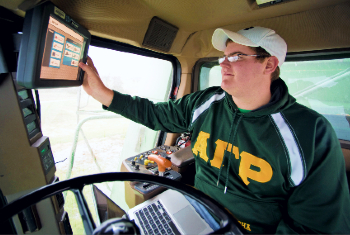 Maximize your career options with the flexibility of a General Agriculture specialization. Or, work with your academic advisor to tailor this degree and specialization to your needs, whether it's the family farm or an agriculture industry career.
Maximize your career options with the flexibility of a General Agriculture specialization. Or, work with your academic advisor to tailor this degree and specialization to your needs, whether it's the family farm or an agriculture industry career.
- Total Degree Requirements: 120 credit hours
- University Core Curriculum: 39 credit hours
- General Agriculture Specialization Requirements: 16 credit hours
- Other required courses: 18 credit hours
- Electives: 47 credit hours
View Curricular Guide (PDF)
- Agricultural Communications
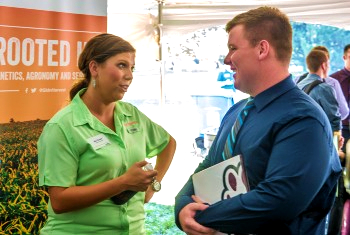 Learn agriculture and communications in this degree. You'll cover animal science, horticulture, crop and soil sciences, agricultural business and economics, and agricultural technology. You'll also learn print and broadcast journalism, marketing and advertising, agricultural publications, and journalism law and ethics. Find rewarding careers with agricultural publications, ag extension services, or in media.
Learn agriculture and communications in this degree. You'll cover animal science, horticulture, crop and soil sciences, agricultural business and economics, and agricultural technology. You'll also learn print and broadcast journalism, marketing and advertising, agricultural publications, and journalism law and ethics. Find rewarding careers with agricultural publications, ag extension services, or in media.
- Total Degree Requirements: 120 credit hours
- University Core Curriculum: 39 credit hours
- Agricultural Communications Specialization Requirements: 16 credit hours
- Other required courses: 9 credit hours
- Electives: 56 credit hours
View Curricular Guide (PDF)
- Agricultural Education
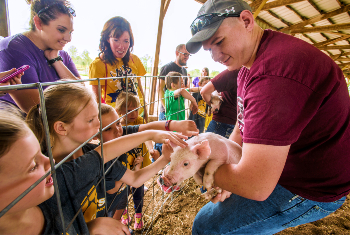 Love ag, teach ag. Our placement is nearly 100%. You'll find Salukis teaching in high schools and extension programs, and also in agricultural communications and corporate agriculture companies. You'll complete the coursework required for teacher licensure in agricultural sciences. You can pair this program with teacher education in other majors, such as biology, math, physical sciences or social sciences.
Love ag, teach ag. Our placement is nearly 100%. You'll find Salukis teaching in high schools and extension programs, and also in agricultural communications and corporate agriculture companies. You'll complete the coursework required for teacher licensure in agricultural sciences. You can pair this program with teacher education in other majors, such as biology, math, physical sciences or social sciences.
- Total Degree Requirements: 120 credit hours
- University Core Curriculum: 39 credit hours
- Agricultural Education Specialization Requirements: 24 credit hours
- Other required courses: 43 credit hours
- Electives: 14 credit hours
View Curricular Guide (PDF)
- Agricultural Production Management
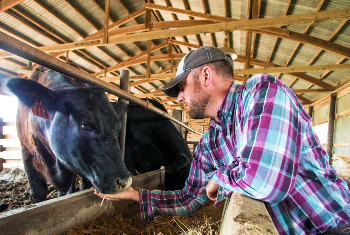 This specialization combines science and economics to focus on agricultural production and production management. It’s an interdisciplinary specialization that draws on courses in agribusiness economics, plant and soil science, plant biology, chemistry and zoology as well as agricultural systems. It’s the right specialization for you if your career goals include:
This specialization combines science and economics to focus on agricultural production and production management. It’s an interdisciplinary specialization that draws on courses in agribusiness economics, plant and soil science, plant biology, chemistry and zoology as well as agricultural systems. It’s the right specialization for you if your career goals include:
- Production management—farms, seed production facilities or livestock production farms and ranches
- Precision agriculture production and technology
- Marketing and sales—supply side or market side
- Education or agricultural technology training
- Total Degree Requirements: 120 credit hours
- University Core Curriculum: 39 credit hours
- Agricultural Production Management Specialization Requirements: 10 credit hours
- Other required courses: 30 credit hours
- Electives: 41 credit hours
View Curricular Guide (PDF)
- Agricultural Systems Technology Management
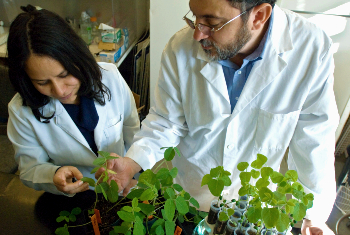 This specialization is for you if you are interested in managing the technical side of an agricultural business—particularly one involved in production, processing or manufacturing. Your coursework will cover agricultural sciences as well as biology and physical sciences, mangerial training and technical know-how. Your understanding of science, systems management and applications engineering will lead you to a career in production and processing of food, fiber, feed or fuel, or other careers that depend on a successful combination of business management and agricultural technology skills.
This specialization is for you if you are interested in managing the technical side of an agricultural business—particularly one involved in production, processing or manufacturing. Your coursework will cover agricultural sciences as well as biology and physical sciences, mangerial training and technical know-how. Your understanding of science, systems management and applications engineering will lead you to a career in production and processing of food, fiber, feed or fuel, or other careers that depend on a successful combination of business management and agricultural technology skills.
- Total Degree Requirements: 120 credit hours
- University Core Curriculum: 39 credit hours
- Agricultural Systems Technology Management Specialization Requirements: 40-41 credit hours
- Electives: 40-41 credit hours
View Curricular Guide (PDF)
- Food and Process Engineering Technology
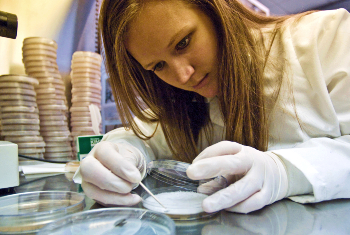 The food processing industry is full of career opportunities. The U.S. Bureau of Labor Statistics rates food science and processing management careers as growing at faster than average rate, with median pay at $68,830 annually. In our program, you'll gain a fundamental understanding of the science of food processing and preservation operations. You'll gain practical experience with food handling, food safety, packaging, process automation, and operations management. You'll also have opportunities to join ongoing research or to launch your own mentored research project. Expect also to participate in labs, projects, and field trips. Internships are an important part of this major—we'll help you get your foot in the door of your career!
The food processing industry is full of career opportunities. The U.S. Bureau of Labor Statistics rates food science and processing management careers as growing at faster than average rate, with median pay at $68,830 annually. In our program, you'll gain a fundamental understanding of the science of food processing and preservation operations. You'll gain practical experience with food handling, food safety, packaging, process automation, and operations management. You'll also have opportunities to join ongoing research or to launch your own mentored research project. Expect also to participate in labs, projects, and field trips. Internships are an important part of this major—we'll help you get your foot in the door of your career!
- Total Degree Requirements: 120 credit hours
- University Core Curriculum: 39 credit hours
- Agricultural Production Management Specialization Requirements: 33 credit hours
- Other required courses: 33 credit hours
- Electives: 16 credit hours
View Curricular Guide (PDF)




 Maximize your career options with the flexibility of a General Agriculture specialization. Or, work with your academic advisor to tailor this degree and specialization to your needs, whether it's the family farm or an agriculture industry career.
Maximize your career options with the flexibility of a General Agriculture specialization. Or, work with your academic advisor to tailor this degree and specialization to your needs, whether it's the family farm or an agriculture industry career. Learn agriculture and communications in this degree. You'll cover animal science, horticulture, crop and soil sciences, agricultural business and economics, and agricultural technology. You'll also learn print and broadcast journalism, marketing and advertising, agricultural publications, and journalism law and ethics. Find rewarding careers with agricultural publications, ag extension services, or in media.
Learn agriculture and communications in this degree. You'll cover animal science, horticulture, crop and soil sciences, agricultural business and economics, and agricultural technology. You'll also learn print and broadcast journalism, marketing and advertising, agricultural publications, and journalism law and ethics. Find rewarding careers with agricultural publications, ag extension services, or in media. Love ag, teach ag. Our placement is nearly 100%. You'll find Salukis teaching in high schools and extension programs, and also in agricultural communications and corporate agriculture companies. You'll complete the coursework required for teacher licensure in agricultural sciences. You can pair this program with teacher education in other majors, such as biology, math, physical sciences or social sciences.
Love ag, teach ag. Our placement is nearly 100%. You'll find Salukis teaching in high schools and extension programs, and also in agricultural communications and corporate agriculture companies. You'll complete the coursework required for teacher licensure in agricultural sciences. You can pair this program with teacher education in other majors, such as biology, math, physical sciences or social sciences. This specialization combines science and economics to focus on agricultural production and production management. It’s an interdisciplinary specialization that draws on courses in agribusiness economics, plant and soil science, plant biology, chemistry and zoology as well as agricultural systems. It’s the right specialization for you if your career goals include:
This specialization combines science and economics to focus on agricultural production and production management. It’s an interdisciplinary specialization that draws on courses in agribusiness economics, plant and soil science, plant biology, chemistry and zoology as well as agricultural systems. It’s the right specialization for you if your career goals include:  This specialization is for you if you are interested in managing the technical side of an agricultural business—particularly one involved in production, processing or manufacturing. Your coursework will cover agricultural sciences as well as biology and physical sciences, mangerial training and technical know-how. Your understanding of science, systems management and applications engineering will lead you to a career in production and processing of food, fiber, feed or fuel, or other careers that depend on a successful combination of business management and agricultural technology skills.
This specialization is for you if you are interested in managing the technical side of an agricultural business—particularly one involved in production, processing or manufacturing. Your coursework will cover agricultural sciences as well as biology and physical sciences, mangerial training and technical know-how. Your understanding of science, systems management and applications engineering will lead you to a career in production and processing of food, fiber, feed or fuel, or other careers that depend on a successful combination of business management and agricultural technology skills. The food processing industry is full of career opportunities. The U.S. Bureau of Labor Statistics rates food science and processing management careers as growing at faster than average rate, with median pay at $68,830 annually. In our program, you'll gain a fundamental understanding of the science of food processing and preservation operations. You'll gain practical experience with food handling, food safety, packaging, process automation, and operations management. You'll also have opportunities to join ongoing research or to launch your own mentored research project. Expect also to participate in labs, projects, and field trips. Internships are an important part of this major—we'll help you get your foot in the door of your career!
The food processing industry is full of career opportunities. The U.S. Bureau of Labor Statistics rates food science and processing management careers as growing at faster than average rate, with median pay at $68,830 annually. In our program, you'll gain a fundamental understanding of the science of food processing and preservation operations. You'll gain practical experience with food handling, food safety, packaging, process automation, and operations management. You'll also have opportunities to join ongoing research or to launch your own mentored research project. Expect also to participate in labs, projects, and field trips. Internships are an important part of this major—we'll help you get your foot in the door of your career!